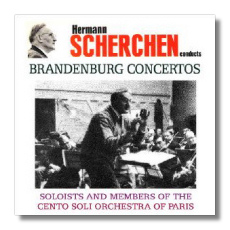
The Internet's Premier Classical Music Source
Related Links
- J.S. Bach Reviews
- Latest Reviews
- More Reviews
-
By Composer
-
Collections
DVD & Blu-ray
Books
Concert Reviews
Articles/Interviews
Software
Audio
Search Amazon
Recommended Links
Site News
 CD Review
CD Review
Johann Sebastian Bach

Brandenburg Concertos
- Brandenburg Concerto #1 for Violin, 2 Horns, 3 Oboes & Bassoon in F Major, BWV 1046
- Brandenburg Concerto #2 for Trumpet, Recorder, Oboe & Violin in F Major, BWV 1047
- Brandenburg Concerto #3 for 3 Violins, 3 Violas & 3 Cellos in G Major, BWV 1048
- Brandenburg Concerto #4 for Violin & 2 Recorders in G Major, BWV 1049
- Brandenburg Concerto #5 for Flute & Violin in D Major, BWV 1050
- Brandenburg Concerto #6 for 2 Violas, 2 Viola da Gambas & Cello in B Flat Major, BWV 1051
Soloists and Members of the Cento Soli Orchestra of Paris/Hermann Scherchen
ReDiscovery RD002/003 2CDs: 68:22, 43:39
If you go to a music store, of which there are fewer and fewer these days, or look online, you'll find a bewildering array of recordings of Bach's Brandenburg Concertos. It was not always so. Back in the 1950s, for example, there was little to choose from. (Thanks to my father, I grew up with a set conducted by one Karl Haas - the same Karl Haas who used to host a syndicated music appreciation show on National Public Radio? - and the London Baroque Ensemble.) When we listen to modern recordings by the latest "period instruments" ensemble, we need to remember that there was a time, not so long ago, when it was considered quite acceptable for a symphony orchestra to play these works, and to play them as if the musicians were playing Mozart or even Beethoven.
Hermann Scherchen is regarded as one of the fathers of authentic performance practice. He was ahead of his time in encouraging performers to play Baroque and Classical music in a style that would have been more or less recognizable to the composer. Nevertheless, these Brandenburgs, recorded in 1954 and originally released by the Club Français du Disque, are very much a reminder of how far we've advanced in the performance of Baroque music during the last five decades. This pair of discs cannot be recommended to the general collector, but he or she is not the person for whom this reissue is intended anyway. Scherchen's 1954 Brandenburgs are a fascinating memento of the way things used to be, and they're also a work in progress: you can hear the gears of change grinding away as you listen to these discs. (The conductor recorded these works again in 1960, with the Vienna State Opera Orchestra, but that's another story.)
Don't start with the Second or Third Concertos, which are marred by sour intonation from the French musicians. Instead, begin at the end: the Sixth Concerto's chocolate-brown color comes across beautifully through the viola playing of Pierre Ladhuie and Jacques Balout. Scherchen's more than leisurely tempos - a consistent feature of this set - add to the feeling of delicious relaxation. The Fourth and Fifth Concertos also are quite successful, thanks to flutists Lucien Lavaillotte and Robert Heriche. By today's standards, the playing seems old-fashioned, but at its best, it shines with the spirit of discovery; there's nothing routine here.
ReDiscovery has had these performances in its catalog for a while now, but David Gideon has newly remastered them. The first four concertos are taken from a reel tape master, and the last two - whose sound I prefer, actually - appear to have been taken from a quiet LP. These CD-Rs come with the most minimal of "booklet" notes - actually, there is no booklet at all, just a title card - but much care has been taken with the source material. This pair of discs will set you back just $25, and that includes shipping. It, and other ReDiscovery titles, may be ordered from www.rediscovery.us.
Copyright © 2005, Raymond Tuttle












